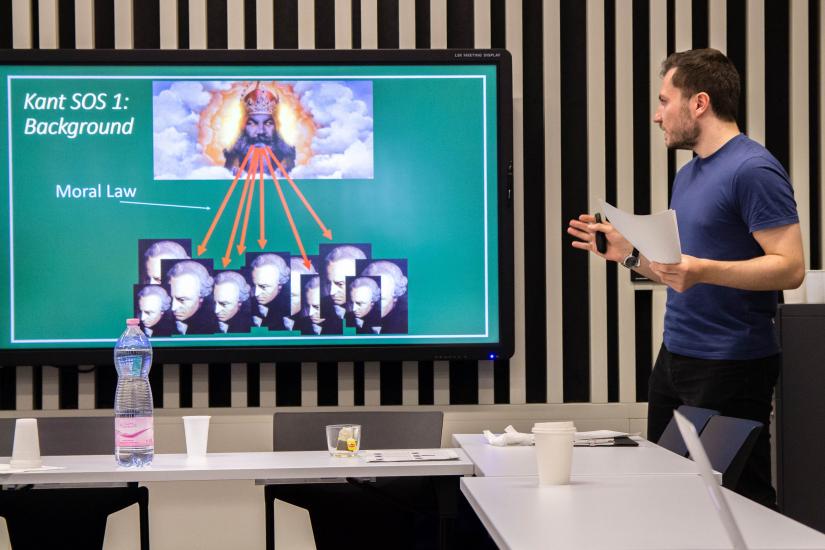
The Department of Philosophy cordially invites you to the Public Defense of the PhD Dissertation
by
Jamie Elliott (PhD candidate, Department of Philosophy) on "Anscombe and 'I'"
Members of the Defense Committee:
Supervisor: Tim Crane (CEU)
External examiner: Adrian Haddock (University of Stirling)
Internal Examiner: David Weberman (CEU)
Chair: Michael Griffin (CEU)
ABSTRACT
My dissertation provides a new interpretation and analysis of Elizabeth Anscombe's paper 'The First Person' (1975). 'The First Person' (1975) provides a philosophical analysis of the first-person pronoun concluding both that ""I" is neither a name nor another kind of expression whose logical role is to make a reference at all" and that "we must accept the rule "If X asserts something with 'I' as subject, his assertion will be true if and only if what he asserts is true of X."" (Anscombe, 1975: 52). Subsequently, these conclusions are to demonstrate both that we are not souls and that self-consciousness is subjectless. Despite initial scepticism as to its coherence, Anscombe’s paper has received renewed attention recently with two schools of interpretative thought emerging in the secondary literature - the radically-non-referring school and the particular-meaning school respectively. The radically-non-referring school interprets ‘The First Person’ as concluding that ‘I’ doesn’t refer to anything in any way whatsoever. Representatives of this first school of thought include Vincent Descombes and James Doyle. The particular-meaning school, by contrast, interprets ‘The First Person’ as concluding that ‘I’ doesn’t refer to the speaker in a particular way, so leaving it open that ‘I’ might refer to the speaker in a different way to the way being denied. Representatives of the particular-meaning school include Sebastian Rödl and Robert Stainton.
My dissertation constitutes a contribution to the particular-meaning school of interpretative thought. I introduce the project of the dissertation as a contribution to the history of ideas which takes a ‘worldview’ approach to interpretation (informed by an inclusive, pluralistic commitment to hermeneutics generally). The worldview approach involves taking all particular Anscombe texts as constituting a whole or worldview and examining how these texts fit together, whether they are consistent or inconsistent etc. In doing this, I provide what I term an internal critique of ‘The First Person’ (1975). This is opposed to an external critique which might seek to show ‘The First Person’ to be flawed through arguing against a first premise upon which it relies.
The primary novelty of my dissertation is that I use Anscombe’s Intention (1957) - a treatise on the nature of intentional action - to interpret referring in ‘The First Person’ as constituting a typically intentional speech act. Consequently, in Chapter One, I interpret ‘The First Person’ as concluding that we do not use ‘I’ to refer to ourselves insofar as that constitutes an intentional speech act of self-reference. Chapter Two develops the idea, briefly suggested by Stainton, that ‘The First Person’ advocates an account of ‘I’ as making (what we would now term) an indexical reference to the speaker. And I use Anscombe-authored texts on political and moral philosophy to explain how indexical reference would be both explicable and permissible given elements of the wider worldview her texts suggest.
Chapter Three investigates the nature of agent conceptions of what they are doing and what they are acting upon in Anscombe’s texts. In particular, I consider whether agent conceptions involved in means-to-end actions can be as basic as the conceptions involved in end-in-themselves actions. In Chapter Four, I suggest one way of interpreting the central argument of ‘The First Person’ as related to Intention (1957); especially to the first principle articulated in Intention (1957) concerning the nature of knowledge. I then use the material of Chapter Three to argue that the central argument (as interpreted) is incompatible with other elements of the wider worldview suggested by Anscombe’s texts. In Chapter Five, I end the dissertation by interpreting out the account of subjectless self-consciousness that ‘The First Person’ (1975) suggests and arguing that the notion of subjectless self-consciousness (as interpreted) is incompatible with ideas found both in ‘The First Person’ (1975) itself and in the earlier paper ‘Substance’ (1964).
Zoom details:
https://ceu-edu.zoom.us/j/94941271957?pwd=V1hqZXpBN0JnWFFjdUVzbDBUTjk1UT09
Meeting ID: 949 4127 1957
Passcode: 750293